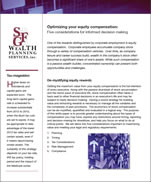By Charles “Chuck” Steege, Personal Financial Planner
The passage of the American Taxpayer Relief Act of 2012 called for a federal tax increase on high income earners, including many SFG clients. We observe that most taxpayers are too focused on completing 2012 tax returns to understand the impact of the Act on 2013 compensation. Just wait…
The implications of higher rates on high earners, increases to support the Affordable Care Act and expiration of certain provisions of the Bush tax cuts will be felt in 2013. For C-suite executives and those who receive significant amount of equity compensation, it is essential to focus on lengthening the holding periods and deferring realization of capital gains.
First, let’s review the highlights of the American Taxpayer Relief Act of 2012*:
- Rise in top withholding rate:
The top federal withholding rate on supplemental income rose to 39.6%. Supplemental income, such as stock compensation, is subject to one of two flat rates that are linked to income tax rates. For aggregate supplemental wage payments totaling up to $1 million during the year, the rate is 25% (the rate of the third income tax bracket). For aggregate supplemental wage payments that exceed the level of $1 million in a calendar year, the rate is now 39.6% (the new rate of the highest income tax bracket).
- Resumption of 6.2% Social Security rate:
The Social Security rate returned to 6.2% after a temporary cut to 4.2% in 2011 and 2012, as the new tax law did not extend the reduction in payroll tax. Social Security tax applies up to a certain amount of yearly income ($113,700 in 2013) and not to yearly income above that threshold.
- Higher capital gains rate for top income earners:
The capital gains tax rate that applies to the proceeds from a stock sale increased to 20% for single filers with yearly taxable income of more than $400,000 and for married joint filers with yearly taxable income of more than $450,000. (For taxpayers whose yearly taxable income is below these thresholds, the top rate of capital gains tax remains 15%.)
- Increased tax rate on dividends:
Similarly, the tax rate on dividends grew to 20% for single filers whose yearly taxable income is over $400,000 and for married joint filers whose yearly taxable income is over $450,000. This applies to any qualified dividends received on company stock you own or on unvested restricted stock for which you have filed a Section 83(b) election.
- AMT patch:
For people with incentive stock options, the income exemption amounts (commonly known as the “AMT patch”) for calculating the alternative minimum tax in 2012 are $50,600 for single filers and $78,750 for married joint filers. Additionally, the new tax law indexed the annual AMT income exemption amounts permanently for inflation. The projected exemption amounts for 2013 are $51,900 and $80,750. The new tax legislation did not extend the refundable AMT credit that was available for the tax years 2007 through 2012.
- Medicare tax rate:
Separately from the American Taxpayer Relief Act, in 2012 the Affordable Care Act increased the Medicare tax rateon compensation income for high-income taxpayers from 1.45% to 2.35%, and a new 3.8% Medicare surtax now applies to investment income, such as capital gains from stock sales. Both of these tax changes became effective on January 1, 2013.*Summary provided by www.myStockOptions.com, a respected source for content and tools on equity compensation topics.
The new income thresholds for increased tax rates, the new Medicare taxes, and the return of exemption/itemized deduction phase-outs will make it more appealing to:
- Postpone some income into the future with the use of an 83(b) election for restricted stock awards that allows for the deferral of capital gains.
- Defer salary and bonus in nonqualified deferred compensation plans.
- Receive stock options, as options offer the ability to time the year for recognizing income, depending on when you exercise them.
Plan to discuss these changes with your tax advisors and call us to meet to discuss how to structure your stock-based compensation planning to defer realizing gains and other implications.
Mr. Steege is President of SFG Wealth Planning Services, Inc. (SFG), a fee-only financial planning firm. Founded 15 years ago, SFG is dedicated to assisting senior executives and their employees with their complex stock-based compensation and planning challenges.


